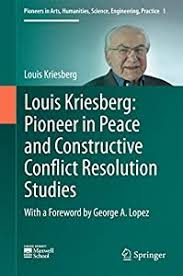Acting Is a Wonderful Way of Avoiding Feeling Despair – A Guide
INSPIRATIONAL, 23 Nov 2020
Louis Kriesberg | The Transnational - TRANSCEND Media Service
21 Oct 2020 – We Americans are beset by many awful circumstances in our country and in the world. As analysts and sometimes as activists we examine such developments, analyzing why they are bad and how they have happened.
So many bad things are occurring every day, it is hard to fight against any one of them, as new ones distract us. Below, I sketch out an approach to taking actions that have a good chance to be effective and satisfying in overcoming objectionable circumstances.
First, we should select three or four matters that we believe should be bettered. We can each choose those matters that particularly concern us. The matters may or may not be connected and they will vary in magnitude.
We should include some local aspects of one or more of the matters that are of concern. We do know that even now, some good things are happening in some cities, some neighborhoods, and some local institutions. They are important, because they have a better chance of being successful, which is encouraging and helps sustain progress. Most bad matters entail contentions, conflicts that embody and sustain them.
Second, we should work with other people to resolve the undesirable matter of concern. It isn’t necessary to build one’s own organization. There are many organizations acting to overcome the bad developments that might concern each of us, which we could join. For example, Indivisible, which functions across the country and was founded soon after Donald Trump’s election, does political action stuff at the local, state, and national level.
There also are local union chapters, religious and ethnic organizations, which might be joined or aided. There are also political reform groups and ones working on specific environmental issues.
Notably, there are formal official institutions with the charter to manage the undesirable circumstances, which may be joined or aided.
Third, we should reflect on alternative strategies that might ameliorate or overcome the destructive matters of concern. Certainly, one part of any effective strategy is to mobilize support for the possible action to win over the adversaries. The primary objective at this stage is to gather the needed power.
There are three sources of power: coercion, persuasion, and positive sanctions, which are combined in many ways in the course of waging a conflict constructively. It would be helpful to hone and apply our persuasive skills in writing and speaking on various platforms; we ought to develop skills to communicate broadly, not only to and for professional colleagues.
We should seek to amass resources that can be used as negative sanctions and/or used as positive sanctions. Adversaries should not be dehumanized and their heterogeneity should be recognized so that some cooperative actions might become feasible with some elements of the opposing side.
Finally – fourth – we must do something. We should formulate both long term and short-term goals. Long term goals project a vision of a hopeful future. Short term goals should be attainable in some visible way, so a gain can be won.
This helps gather more support. In any case, moreover, overreaching should be avoided, since large losses by opponents can provoke them to win great pushbacks.
Best of all, opponents may come to see that they have also gained some benefits by the new circumstances.
Acting is a wonderful way of avoiding feeling despair. It can be fun. It keeps hope alive.
Having written this, I recognize that I have pursued changing versions of this approach throughout my life.
_____________________________________________
This post also appears on the Beyond Intractability website. The blog is the Constructive Conflict Initiative / COVID-19 Blog and Lou’s essay is here.
Tags: Emotional Health, Inspirational, Mental Health, Psychology, Solutions
DISCLAIMER: The statements, views and opinions expressed in pieces republished here are solely those of the authors and do not necessarily represent those of TMS. In accordance with title 17 U.S.C. section 107, this material is distributed without profit to those who have expressed a prior interest in receiving the included information for research and educational purposes. TMS has no affiliation whatsoever with the originator of this article nor is TMS endorsed or sponsored by the originator. “GO TO ORIGINAL” links are provided as a convenience to our readers and allow for verification of authenticity. However, as originating pages are often updated by their originating host sites, the versions posted may not match the versions our readers view when clicking the “GO TO ORIGINAL” links. This site contains copyrighted material the use of which has not always been specifically authorized by the copyright owner. We are making such material available in our efforts to advance understanding of environmental, political, human rights, economic, democracy, scientific, and social justice issues, etc. We believe this constitutes a ‘fair use’ of any such copyrighted material as provided for in section 107 of the US Copyright Law. In accordance with Title 17 U.S.C. Section 107, the material on this site is distributed without profit to those who have expressed a prior interest in receiving the included information for research and educational purposes. For more information go to: http://www.law.cornell.edu/uscode/17/107.shtml. If you wish to use copyrighted material from this site for purposes of your own that go beyond ‘fair use’, you must obtain permission from the copyright owner.


